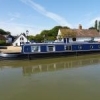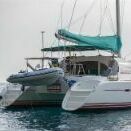Leaderboard
Popular Content
Showing content with the highest reputation on 02/11/17 in all areas
-
I was here previously researching for the purpose of purchasing a Narrowboat. Then In July 2013 I suffered a major stroke (haemorrhage). I’m not complaining because I have had what the medical peeps refer to as a remarkable recovery and I realise there are many people who are not so fortunate. I now have some cognitive issues around memory and what I call logical processing. It makes research difficult as I quickly forget what I have just read and I often make decisions without remembering all the facts which I later remember! My rehabilitation probably took 2 years when at which stage I felt I was back in the land of the living. Then late 2016 It was suspected I had rectal cancer. After numerous tests and scans I underwent surgery in April to remove the tumour and I am now in my final stage of chemotherapy treatment. So I am ready to finish what I started and purchase a boat. The problem is I have forgotten a lot of my previous research and I am having difficulty researching the subject in detail which I had done previously. I have come to the conclusion that I want/need a 62’ trad stern with a boatmans cabin. Unfortunately there are not many of those available. I missed out on Carpe Diem, a Hudson which suited my needs perfectly. So I am now considering 70’ trad stern boats which also have a boatmans cabin. The reason for the boatmans cabin is that my daughter now lives in Kingston upon Thames so it would give her and her partner to visit and stay with us whenever she wanted. i am aware of some of the issues with such a large boat ie extra costs re mooring and blacking etc but I would be grateful for people’s opinions and advice regarding 70’ boats. Apologies for the initial rambling but I wanted to explain why I will be asking some more questions in the near future. Kind regards - Martin3 points
-
I boat and I fish. I am very rarely miserable. Have to say I find some of the above posters views to be rude. Ian.3 points
-
To quote the old saying, "Give a man a fish, you can feed him for a day. Give him a fishing rod, and you can make him a miserable ******* for the rest of his life"3 points
-
This post cannot be displayed because it is in a forum which requires at least 10 posts to view.
-
Keeping batteries charged whilst living full time on a boat on the English waterways in winter is a pretty minority activity and so, to my knowledge, nobody has written a book about it. Even worse there are many styles of boat living and several ways to charge batteries and almost nobody has a good appreciation of all of this. There are some people about with lots of knowledge about batteries and electricity but I suspect most of those would be very surprised if they tried to live on a boat in the winter. ..................Dave2 points
-
2 points
-
I certainly did and am still here. I need to go down to Northwich for a few days but hope to get up here again next week. They have a great open mic night at the Red Lion, for a small depressed town they have some very talented people. I love the Weaver, it must be a very expensive navigation to maintain and is not used nearly enough by boaters to justify this expense, the last thing it needs is fishermen scaring boaters away. This is why I have submitted an incident report so that CaRT can, I hope, have a word with the fishing club. ..............Dave2 points
-
This post cannot be displayed because it is in a forum which requires at least 10 posts to view.
-
This post cannot be displayed because it is in a forum which requires at least 10 posts to view.
-
1 point
-
1 point
-
This post cannot be displayed because it is in a forum which requires at least 10 posts to view.
-
Do you know that the inverter is centre tapped, as opposed to just being floating? If the latter, you need to bond the N to E at the inverter output. If the former, an RCD should still trip but you need to use double pole RCDs and double pole MCBs (or a double pole RCBO). But remember, the RCD is there to prevent you dying, not to prevent you getting a nasty shock! If the RCD threshold current is set too low, you get a lot of nuisance trips. 30mA is the normal value to make reasonably sure you don't die. But you will still get a very painful shock with 29mA! This is probably why the RCD didn't trip - you simply didn't take enough current at the 110v you fed yourself. Try it again but with both hands wet, one holding the steel hull. Hopefully the RCD will trip. JUST JOKING! DONT TRY THAT!1 point
-
Oi, I've got one of them. Not only have I got no soul I have no need of Whitworth spanners, a sledgehammer, easy start, a rupture truss, a gorilla to start the bastard and I don't look like a panda after peering through the black smoke from the exhaust.1 point
-
Slightly ironic to have a whinge-fest about how miserable anglers are. I can see from the perjorative descriptions used how even handed and open minded you all are. Rog (a happy boater and angler)1 point
-
my fella is also a very keen fisherman .and like ianali said .a bit unfair to the fisherman ..if a fisherman catches lots of fish from the same place .they will very often go back to that same spot .true they do fish in some places they are not allowed ...bit like me some times mooring where im not suppose too not very often but it has happened .we have come across ..some horrible fishermen and some very nice ones ...i have also come across some very nasty boaters .and again some very nice ones ..and there was not a fisherman in sight ..they where just nasty boaters ...1 point
-
This post cannot be displayed because it is in a forum which requires at least 10 posts to view.
-
This post cannot be displayed because it is in a forum which requires at least 10 posts to view.
-
This post cannot be displayed because it is in a forum which requires at least 10 posts to view.
-
I am all for standing my ground and telling the maggot fiddlers to sling it, but only if i was going to be aboard my boat all day, i remember a tweet a couple of years ago where a boat got painted with some choice words down the side, allegedly by a maggot fiddler not happy as the boat was in his spot..1 point
-
This post cannot be displayed because it is in a forum which requires at least 10 posts to view.
-
1 point
-
This is why when we are on the rivers we leave our bathing ladder folded down in the water. The rungs reach low enough into the water to make getting out easier and for the vertically challenged like myself the stern drive is an extra step up. It has been used by several boaters over the years who could not get back out onto their own boats.1 point
-
Here's a link to the 70ft boat Athy mentions: So sorry to hear about your health problems by the way. I had a brain haemorrhage myself a few months ago but have been lucky enough to make a good recovery with no cognitive issues (although I'm likely to need surgery soon to prevent further bleeds). I can only imagine what a long slog that two years of recovery was for you, and what it's like to be dealing with the issues you describe on a day-to-day basis.1 point
-
1 point
-
This post cannot be displayed because it is in a forum which requires at least 10 posts to view.
-
Feel free to apologise to all and sundry for the current resident of the Whitehouse. And remember that trump is a synonym for fart!1 point
-
I think you are over-extrapolating. Of course it is difficult to predict inflation, of any kind. If it were easy we'd all be doing it. However, whilst there are unanticipated changes in the rate of change, it is rarely a step function (unless we are daft enough to have a Brexit referendum!) and a budget based on extrapolation from the past few years is much better than a zero based estimate. But efficiency savings are zero-based - that is in most cases we have no prior history to build on, at least not directly and, to make it worse, there are two components which are differenced (ie the saving is the difference between a changing cost and benefit) which is inherently less stable. You also have to add in estimates of timing which may change for reasons entirely out of your control. For example, you may plan a new project only to discover that there is no-one prepared to tender for it on the planned timescale, just because they are already fully booked. (You may plan to save money on your heating costs by having a proper service but find everyone booked out for the next six months so no savings until much later) Too many organisation fixate on one year at a time budgets rather than longer term planning (planning in this way does not fit with the obsessed market driven politics that asserts that free market provision is always more efficient - that just ain't so!) But I agree that this does nothing to reduce the maintenance problem. However, careful what you wish for. Either we return to a publicly funded model with a block grant that is sized according to need but, as we see with much more important matters such as the NHS, we are long past the time when 'the public' (ie voters) are prepared to pay up taxation on the basis of meeting a general need and blindly believe those who promise to reduce taxes without impacting service levels. Alternatively, we go further into the free market model and that will involve all sorts of changes that many users, especially traditionalist, will inevitably rail against. One of the consequences of this approach is that the user voice is much more frequently ignored in the pursuit of the 'does it make a profit?' mantra. We could, then, stick with the mixed mode approach of part block grants and part market economics. It may be a bit messy but it is probably better than either extreme. But, without something like a charge for usage toll system, it will mean that a maintenance shortfall is all but a fact of life. Much better to concentrate on positive pressure to do things better, or even more efficiently, than just bemoaning that it is not perfect. CaRT Board know that and it does not take Cassandra to tell them.1 point
-
The problem with your question is that there are no definitive answers about the subject. It is even arguable that we do not yet fully understand how our lead acid batteries work. Then there is the large range of battery types and construction even before you consider the almost infinite ways boaters and others use their batteries. If you have a look at my website that I wrote as a free resource to try to help and advise actual and potential ordinary (as in non-expert) boaters you will see there is no definitive battery advice. Only examples of how to do the basic "calculations" so you stand some chance of understanding what you need to in order to minimise battery problems and get an optimum battery life. This is deliberate because there are no right or wrong answers to the question. It is also a very large question because to get the best from your batteries you MUST start with assessing your electrical requirements, from that battery bank size, and then sorting out the charging. This then feeds back to electrical demand until you develop a suitable balance. Even then a suitable balance is likely to be different for different people. Just be wary of commercial offerings like the above link, there is always the danger that any such text will make more of the company's products than those from other companies. The battery "guidelines" are simple enough: 1. Install at least 25% more battery capacity than you calculate you need (to allow for some loss of capacity caused by sulphation).. 2. Try to avoid discharging below about 50% of charge (to maximise cyclic life). 3. Recharge as fully as you can as soon as you have discharged the batteries (to minimise the rate of sulphation). 4. Install some form of battery monitoring. (so you can comply with 2 and 3 above). 5. Learn how to use the battery monitoring equipment and FULLY UNDERSTAND its weak spots. Yes you do have it right and if you look at the questions you will see fairly large scale unwillingness to answer questions (typical excuse - "I can't do a power audit) and then take advice. Personally I get by well enough with a voltmeter and decent ammeter to monitor my batteries. The voltmeter will tell me when 2 above comes into play BUT when and the conditions I read it under are important. That is usually first thing in the morning or last thing at night with no solar input and no other loads drawing power. 3 above is accomplished by having solar charging and running the engine every day when I have no shore powered charger. Others may use a generator. I then keep charging until the charging amps are around 1% to 2% of battery capacity so with a split charge system and 430Ah of battery capacity I try to charge until the current drops to about 10 amps with no significant electrical loads. PS - Alan's put back in 20% more than you have taken out is again only a guide. The figures I obtained on line suggest anything between 10% and 40% depending upon battery construction, temperature and condition and those tend to be unknown. This is avoided by the 1% to 2% of battery capacity charging current thing.1 point
-
I hope you are wrong. The Basingstoke has, in my opinion, suffered greatly by being jointly owned by Surrey and Hampshire County Councils, who have minimised spend on the navigation elements (how long was the canal closed at Deepcut because of the need to spend money on new lock gates). I think it would have fared better hnder BW/CRT ownership.1 point
-
Dear Boiley, Rant away! My exhortation to enjoy was a lazy shorthand just before I made my way to bed. What I meant was don't get too hung up on the dos and don'ts of canal etiquette to the detriment of having a happy time. Even if you make a slight faux pas on the Cut as long as you have a polite attitude and a ready smile most boaters will forgive you. They might post on a canal forum to tell others of the numpty they met today but think of the pleasure you will have given them. regarding the insomnia. Alcohol acts as a stimulant, have you considered Horlicks?1 point
-
Sorry I have to disagree there; Rule No1: if you are in the pub and happen to meet anyone who owns a green boat, it is customary to buy them beer I believe it is a tradition or an old charter or something1 point
-
This post cannot be displayed because it is in a forum which requires at least 10 posts to view.
-
This post cannot be displayed because it is in a forum which requires at least 10 posts to view.
-
This post cannot be displayed because it is in a forum which requires at least 10 posts to view.
-
To help with basic boat handling: 1. The boat will only steer when you have power on, in the forward direction. Doesn't have to be much power, but it does have to be forwards. In tight spots, it pays to come in as slowly as possible and then use quick bursts of power with the rudder fully over to steer, using reverse to slow down inbetween if necessary. With practice it's possible to get the boat turning and let it continue the turn whilst putting it in reverse. "Pumping" the rudder can sometimes help you to turn more sharply. 2. When steering, the boat will pivot roughly around the middle. It's therefore essential to allow space for both the pointy end and blunt end to swing when turning. 3. High winds can be a real nuisance, in general slightly more power is often the answer, even though it's more inuitive to back off. 4. Contrary to popular advice, boating ISN'T a contact sport. However it's a very inexact game and the only way to learn is to start. No-one minds if you're trying your best to avoid a collision but end up nudging another boat gently becuase you've run out of options / luck / skill. Just try to do it as slowly as possible (i.e. while making considerable effort not to make contact at all) and say sorry if necessary. There's nothing more British than everyone saying sorry to each other over an event that was pure random bad luck. 5. Tea should be used for bribery purposes prior to 12 noon, beer thereafter.1 point
-
Probably this was a warm and sunny weekend with barely a cloud in the sky. Never a volly around when I'm doing a flight in the slashing rain and it's getting dark and I actually need some help.1 point
-
This post cannot be displayed because it is in a forum which requires at least 10 posts to view.
-
This post cannot be displayed because it is in a forum which requires at least 10 posts to view.
-
The problem as I see it, all over is that outsourcing repairs and maintenance may cut costs, but it is leading to more work needing to be done. For example, a CRT survey is done of bricks in a lock that need rebricking and grouting. The survey shows a critical area of 100 bricks. The job sheet is outsourced. By the time the actual works take place, 127 bricks are needing repair. The contractor does the specified 100 bricks, the other 27 are left for the next survey.......even though BW , and CRT would have done the whole lot in years gone by.1 point
-
All good points and sensible advice, but having myself had a Shoreline larder fridge, I have chosen the opposite route and wish I had done so in the first place. I found the Shoreline to be of okay quality but by no means excellent and after just two years of use it finally packed up after many months of ever increasing 'on' time from the compressor, until at the end it just didn't turn off at all. Shoreline advised that I should buy from them a £40 replacement thermostat which I questioned but did, but that made no difference and they weren't interested in taking the part that they advised me to buy, back for a refund. So much for a fridge that cost the best part of £600. They then said it needed re-gassing, but couldn't help with that and advised me that the new gas would probably leak away like the original had. Being distinctly unimpressed with Shoreline and their fridges, I bought a Beko mains fridge which was just £120 delivered and to my mind of superior quality and better insulated, demonstrated by the fact that the compressor is 'on' for less time each hour than the Shoreline was, even when it was new. I was concerned about compressor inrush current and what would be the minimum inverter size that I would need to operate a mains fridge, so following much experimentation with several inverters, I can report that the Victron 12v 350w pure sinewave inverter will definitely NOT start the fridge's compressor, despite the compressor being rated at just 85w and the Victron having a published 'peak power' of 700w. I have tried the fridge with a Victron 12v 800w inverter with a 'peak power' of 1600w and that will start and run the compressor perfectly. The received wisdom is that compressor motors aren't keen on the output of modified sinewave inverters, so I tried mine with a Sterling 12v 800w unit and there have been no changes whatever in noise, vibration or other detectable characteristics after three months with the modified sinewave unit. The fridge worked perfectly and since the Victron unit was 2 1/2 times the price of the Sterling and 2 1/2 times the price of the fridge as well, I would be very happy to take the risk and stick with the Sterling modified unit. My conclusion is, that mains fridges need a minimum of an 800w inverter and if money is of no object then buy a pure sinewave inverter, but if not, then a modified sinewave unit will work and given the saving, is probably worth the risk. The Sterling will also run the TV, the PVR, the PC and various chargers; in my experience, everything in fact up to its limit of 800w. If you fit an inverter solely to run a mains fridge, then you might consider fitting a remote 12v thermostat to the fridge that powers up the inverter only when the fridge needs cooling. This is very cheap and easy to do and is what I have done on my other boat to avoid the 'no load' power drain from a powered up inverter. Efficiency is critical for us, as we live aboard, have no access to shore power, are 100% 'off grid' and generate all of our electricity using solar panels and wind turbines.1 point
-
This post cannot be displayed because it is in a forum which requires at least 10 posts to view.
-
I used Craig Allen when I bought DQ. He did a very thorough job, I recommend him. http://craig-allen-marine.co.uk1 point
-
Try Tom Keeling he is spot on 0797 6631920. Always busy but then you don't want one that isn't.1 point
-
Taking the OP at his request: One of the difficulties in analysing long term trends on costs (spend) is where the underlying unit costs change. Most users (of almost anything) are not concerned with the actual costs but the effectiveness of that spend. However, this is not so easily measured or digested down to a few numbers. What is clear (at least to me) is that CaRT have been quite seriously trying to develop more cost effective ways of working - not always to the approval of traditionalists who perhaps seem to assume that below-minimum-wage operatives and ignoring H&S expectations are a good basis for business today. Being more costs effective may well require the breaking of the mould! If an organisation does succeed in find a way of doing a key task at less cost then, if the overall service level is maintained, the actual total spend will decrease without impacting the users. This, surely, is a 'good thing'. Whilst 'just in time' maintenance is oft derided (wait until it breaks before fixing it) it is not always obvious that the 'stitch in time' principle applies, especially where rapid deployment techniques are used. After all, this is what has driven down retail prices in places such as supermarkets. In this example, stock is not held on shelves in great quantities just because there is a monthly delivery schedule but re-filled on a few hours notice. It could well be the case that with canals, having rapid deployment and good on-site assessment can result in a lower costs with no, or limited, impact on service levels. after all, canals have always broken down from time to time! Assets with a long life can either be replaced on a schedule (like light bulbs used to be) or left until failure. In the former case it is quite possible that there is considerable 'wastage' whilst just-in-time might mean a rise in service interruptions (although that is not guaranteed). In today's society, perceived wastage is a growing target for adverse comment. (The reason that supermarkets have got into the habit of disposing of short dated food is almost certainly that they calculated it to be the cheapest way of meeting demanded service level but they are now discovering new markets for stuff once unused - I do tend to look for good deals on wonk foods!) I have certainly noticed this year a significant increase in the number of times that stoppage notices refer to reviews that mean that things are done differently, or deferred, or brought forward, in the light of on-site assessment rather than blindly going ahead with a stoppage that was planned two years ago. To me this is, at least prima facie, a good sign as it shows that CaRT are trying hard to use modern techniques in maintaining a ancient asset! Just one example can be found on a recent thread regarding soil injection technology. The use of radar to plan dredging schemes is another that was not available in the past. Whilst it is important that folk such as the OP continue to hold CaRT to task over their spending plans, I do hope that it can be done intelligently so that they are not deterred from trying new ways (some of which will inevitably fail if they are being adventurous enough) just because the 'public' don't like it.1 point
-
This post cannot be displayed because it is in a forum which requires at least 10 posts to view.
-
Ok let me start by saying that if you dont have a good signal you will never get the service that you are looking for, but most people should be able to get a good solution if it is designed and installed correctly. Start by looking at the coverage maps for mobile networks for their 4G networks, if it says that you should get good indoor 4G coverage then you will be ok, even if it says good outdoors coverage there are things you can do to make sure you get a good connection.. Now to the bit I will guess will cause some comments. If you want a business grade service a consumer MIFI type device will not provide you with the type of service you are looking for, well not one that I would bet my business on anyway. firstly you need a good external aerial, my recommendation is a good quality omni directional aerial, again people will start to say a directional yagi etc etc will be better and there is something in what they say but also with LTE ( 4G) it can also make things much worse so on average a good omini will work better more often. Also you need two of them and its best to place then a few feet apart, again you can buy great aerials which actually have two seperate aerials in one housing and they have two cables coming out of them ( I use one of this type and mine also has 2 wifi and a GPS aerial in it as well so 5 cables coming out and mine works ok). Next you need a good LTE ( 4G) router and here you definitely get what you pay for, go for one that is designed to work in vehicle and run on 12v and it should work well. If you want a belt and braces solution go for a router that supports two sims, then you run on two seperate networks which gives you better odds of having a good signal. my preference based on network coverage and performance is EE and Vodafone. Then you have the choice to connect an internal WIFI device in the boat to extend your data connection or use a wired connection, wired is always better. now there are mobile solutions that are used by coaches to provide WIFI streaming to its passengers, also the police use systems that then use their patrol car to act as a local data point that the on foot offices connect through to provide a performant and secure connection for personal video and data . So what would this cost, well I doubt you could set up a system for much less than £800- £1000. and such a system is not for the average narrow boat user but if you are running a business then its a different matter. As to how good could this be, I have installed similar systems in high street retailers to run all their in store systems on and they are stable and work great, there are however some locations where it wont work and we have to put in a land line but that is less than 5% of locations and getting less every month. As to router manufacturers the main commercial grade ones I have seen that work well are peplink and cradlepoint or Sierra Wireless who between them have most of this market and antennas two makes I have had good results with are Panorama Antennas and Mobile mark. I have no connection to these companies other than as a satisfied customer so I would advise that you speak to on of them or similar specialists in commercial mobile data solutions. Wireless Connectivity, Westbase and Aquamare Marine. Personally I have set up that allows me to work from the boat and I use webex conferences, stream video and transfer files as good as if I was in my home office, I also use Now tv and Netflix for streaming video, occasionally it buffers but not enough to be annoying and my clients are amazed when I say I am working from my narrowboat. you absolutely get what you pay for but make sure you pay for good advice as that is the best money you will spend.1 point
-
Might save some time and aggro in the long run to learn up front how to rely on ammeter and voltmeter alone. The amount of time lost and trouble caused by people taking the Smartguage reading as gospel.1 point
-
This post cannot be displayed because it is in a forum which requires at least 10 posts to view.
-
It is amazing how 'rule-stretchers' & 'birds of a feather flock together'.1 point
This leaderboard is set to London/GMT+01:00



















